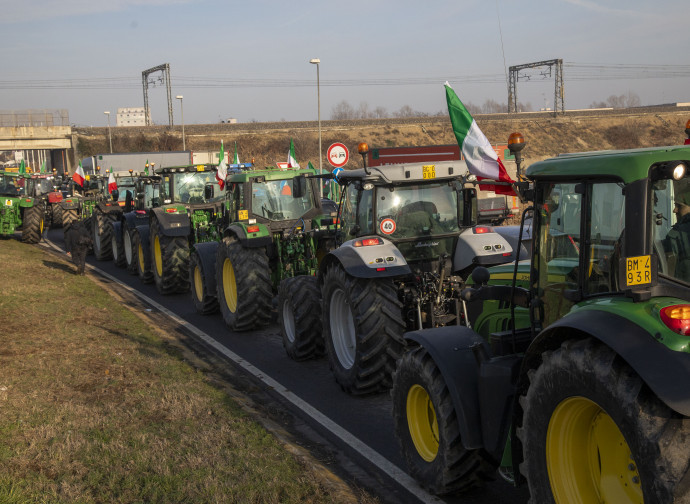European Green Deal destroys agriculture and threatens the environment
Drastic cuts in pesticides, the extension of organic farming, and the reduction of cultivated land are measures aimed at a 'degrowth' that threatens the whole of society. Brussels must re-open a dialogue with the agricultural world.

Second of a series of two.
The idea that only 'natural' and non-intensive farming is the only truly environmentally sustainable method is now more widespread than ever among European citizens. On the contrary, there is scientific data which clearly indicate that the environment is protected precisely by intensifying agriculture with the aid of innovative and 'low impact' science-based technologies (animal and plant genetics, cultivation and breeding techniques, etc.), while agricultural systems with low production efficiency generate much higher and generally unsustainable environmental impacts per unit of product.
Suffice it to reflect, for example, on the fact that to obtain the same quantity of goods with extensive agriculture that produces half as much per unit area as intensive agriculture requires twice as much land, which today can only be obtained by cutting down forests and clearing natural grasslands with enormous damage to biodiversity.
Or reflect on the fact that to produce one litre of milk and deliver it to the consumer's table, 1.3 kg of CO2 equivalent is emitted today if this milk comes from intensive livestock farming in large open barns, while it rises to 3.7 kg of CO2 if the same milk is produced by grazing livestock. We write this not so much to demonise grazing livestock (the nomad shepherd in Asia is not a 'bad guy' and the alpine and Apennine mountain dairy farmer is a resource for land conservation!) as to stigmatise the senseless demonisation of intensive livestock farming that has been going on for some time.
Unfortunately, affirming in public opinion the merits of intensive farming based on scientific research and technological innovation is becoming increasingly difficult. For years, grotesque and pseudo-scientific visions have prevailed that through the media influence the ideas of public opinion and politics at national and European level. It is also from these misleading visions that the EU's general approach of the 'green deal' derives, which in agriculture is embodied in the 'farm to fork', 'biodiversity' and 'renaturalisation' strategies. Disconcerting measures are taking shape from such strategies, including:
1. The intention to reduce by 50-60% the quantity of plant protection products permitted for use, based on a rigid 'algorithm' that does not take any rational aspect into consideration, jeopardises the entire phytosanitary protection of crops: if crops are not protected from insects, pathogenic fungi, bacteria, weeds, and other enemies, the products obtained will in many cases be less healthy (many pathogenic fungi and bacteria are capable of producing toxins with negative effects on health) and in many cases so scarce as to make their harvesting uneconomic. It should be remembered that the impact of such a 'prohibitionist' approach is particularly dangerous for the agriculture of Mediterranean countries (Italy, Spain, Greece, and Portugal), which are based on crops (fruit, vines, and horticultural crops) that have significant needs in terms of phytosanitary defence.
2. The intention to expand organic farming from 9% to 30% of the utilised agricultural area. This will lead to yield drops of 20-70% depending on the crop, resulting in an explosion of imports at a time when, globally, security of food and energy supplies is a top priority for states that want to maintain their sovereignty. Could it be that the Russian-Ukrainian war has taught us nothing?
3. The decision to 'renaturalise' vast territories where agricultural activity has taken place for thousands of years, without asking what will come of it in terms of flood defence or in terms of defending agricultural activity from invasive wild species.
All this is taking place in a European context marked by a persistent distrust of innovative genetic improvement technologies (GMOs, NBTs), whose prejudiced rejection places European farmers in a quantitatively and qualitatively inferior position compared to competitors in other agricultural areas of the world.
Ultimately, the farmers' cahier de doléances is really full, as much on the side of unacknowledged merits as on that of 'degrowth' policies, dangerous not only for the agricultural sector but for society as a whole.
But will this protest really be useful?
The farmers' protest will only be useful if it helps to comprehend a reality that goes far beyond the 'complaints' of the moment but affects the whole of European politics. Because the 'misunderstood environmentalism' that seems to condition EU institutions (but also rather numbed national governments) risks doing damage to the economy, society and, paradoxically, even the environment. In particular, the Community agricultural policy seems to be oriented towards a rigid dirigisme that looks more and more like a surreptitious 'kolkosization' [forced collective farming] of European agriculture, whereby a 'ruling class' divorced from reality but firmly established in the 'palaces' of Brussels, of the Ministries or of the Regions would like to impose a suffocating welfarism on producers, made up of subsidies similar to handouts against impracticable and absurd operational rules to be applied 'in the field'.
In order to accompany the protest with the proposal, it would be necessary today to start that 'strategic dialogue' on agriculture to which President von der Leyen has finally declared herself willing. Even more so, it would be useful to re-establish on a new basis that 'alliance' between agriculture and society on which food security is based, today exposed to real risks. For this to happen, however, a cultural basis is indispensable, with respect to which both the agricultural world and political decision-makers are perhaps currently lacking, and on which academic institutions will have to work harder and harder in the general interest.
EU attack against farmers is self-defeating
The agricultural sector not only ensures food security, but also absorbs four times the carbon dioxide it emits while protecting land. Yet, European institutions are heavily penalising farmers in the name of an illusory climate 'salvation'.
